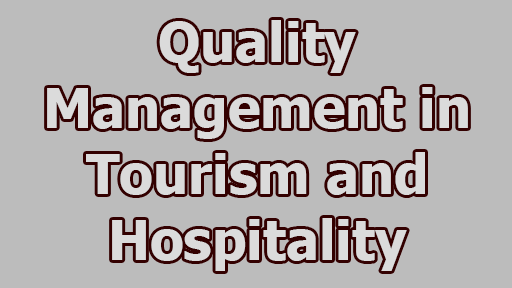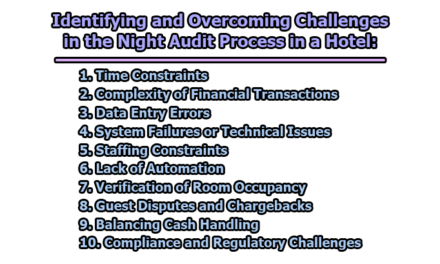Quality Management in Tourism and Hospitality:
The tourism and hospitality industry stands as a cornerstone of the global economy, offering travelers diverse experiences and accommodations. As this industry flourishes, providing exceptional service and quality management becomes an imperative rather than an option. With ever-increasing customer expectations, maintaining high-quality standards is pivotal for success. This article will delve into the realm of quality management in tourism and hospitality, exploring its significance, strategies, and impact on guest satisfaction.
The Significance of Quality Management:
Quality management in tourism and hospitality is a multifaceted concept that encompasses various dimensions of service delivery and guest experience. It transcends the mere fulfillment of basic traveler needs; it aspires to exceed expectations and create indelible memories. Several compelling reasons underscore the paramount importance of quality management within this industry:
1. Guest Satisfaction: At the heart of the tourism and hospitality industry lies the concept of guest satisfaction. Satisfied guests not only return but become fervent advocates of specific establishments, propagating positive word-of-mouth and attracting a burgeoning clientele. Quality management guarantees that guests are recipients of consistent, high-quality experiences, thereby augmenting their satisfaction and loyalty to the establishment.
2. Competitive Advantage: In an intensely competitive market, quality management emerges as a potent differentiator. Travelers are presented with an array of choices when it comes to accommodations, dining, and entertainment. Establishments that perpetually deliver excellent service and experiences gain a substantial competitive edge, drawing more patrons and outperforming their rivals.
3. Cost Efficiency: Effective quality management systems streamline operations, thereby reducing operational costs through the minimization of errors, waste, and rework. When processes are optimized and employees are adept at delivering high-quality service, resources are utilized more efficiently, contributing to enhanced financial performance.
4. Legal and Regulatory Compliance: The tourism and hospitality sector is subject to a labyrinth of regulations and standards, spanning from health and safety to environmental sustainability. Quality management practices are instrumental in ensuring that businesses adhere to these requisites, thus mitigating legal risks and potential liabilities.
Strategies for Quality Management:
Attaining and sustaining high standards of quality in tourism and hospitality is a multifaceted endeavor that encompasses strategic planning, training, continuous improvement, and an unwavering customer-centric approach. Here are some potent strategies for quality management:
1. Cultivating a Customer-Centric Culture: The foundation of quality management in tourism and hospitality is the cultivation of a customer-centric culture. Research by Bardi and Avelar (2019) underscores the significance of this approach. Establishments that prioritize guest satisfaction by instilling a customer-centric mindset in all employees, regardless of their positions, tend to achieve higher levels of guest satisfaction.
This strategy involves not only training staff to understand the profound significance of customer service but also empowering them to make decisions that enhance the guest experience. When employees are aligned with the goal of exceeding guest expectations, it results in a more welcoming and accommodating atmosphere, which directly impacts guest satisfaction.
2. Employee Training and Development: Investing in the comprehensive training and development of staff members is another critical aspect of quality management. Choi and Chu (2001) emphasize the importance of well-trained staff in their research on hotel guests’ satisfaction. Employees should undergo rigorous training in customer service, communication, and problem-solving.
Regular workshops and refresher courses are essential for keeping employees’ skills up-to-date. Continual learning and development not only enhance the quality of service but also contribute to employee satisfaction, which, in turn, translates into better guest experiences.
3. Standard Operating Procedures (SOPs): Establishing clear and standardized operating procedures (SOPs) is indispensable for ensuring consistency in service delivery. Textbooks like “Managing Front Office Operations” by Kasavana et al. (2011) emphasize the significance of SOPs in the hospitality industry.
SOPs should cover every aspect of guest interaction and service, ranging from check-in/check-out processes to housekeeping and maintenance. When these procedures are well-defined and consistently followed, guests can expect a uniform level of service quality, regardless of the staff member on duty.
4. Continuous Monitoring and Feedback: Continuous monitoring and feedback mechanisms are paramount in quality management. Research by Yoo and Bai (2011) highlights the importance of feedback in the context of employee service quality and customer satisfaction.
Regularly monitoring and assessing service quality can be achieved through guest feedback, online reviews, and internal evaluations. Analyzing data allows businesses to pinpoint areas in need of improvement and take corrective actions promptly, leading to enhanced guest satisfaction.
5. Technology Integration: The integration of technology plays a significant role in streamlining operations and enhancing the guest experience. Research by Xiang et al. (2017) provides insights into the impact of technology on the hospitality and tourism industry.
Technology integration may encompass online booking systems, mobile check-in, and in-room automation for climate control and entertainment. These innovations not only improve operational efficiency but also cater to the preferences of tech-savvy travelers, contributing to guest satisfaction.
6. Sustainability and Responsible Tourism: In the contemporary landscape, quality management also encompasses sustainability and responsible tourism practices. Research by Han and Kim (2010) delves into the decision-making process of green hotel customers.
Establishments should strive to minimize their environmental footprint, support local communities, and engage in ethical business practices to meet the expectations of eco-conscious travelers. Incorporating sustainable practices not only aligns with responsible tourism but also appeals to a growing segment of environmentally conscious guests.
The Impact on Guest Satisfaction:
Effective quality management exercises a profound influence on guest satisfaction, which, in turn, exerts far-reaching ramifications for businesses within the tourism and hospitality sector:
1. Positive Reviews and Repeat Business: One of the most immediate and visible outcomes of effective quality management is the generation of positive reviews and the cultivation of repeat business. Satisfied guests are not just contented customers; they become enthusiastic advocates. Research by Sparks and Browning (2011) highlights the substantial influence of online reviews on guest booking intentions and trust perception.
Contented guests are more inclined to leave positive reviews on various platforms, such as TripAdvisor and Google Reviews. These reviews serve as powerful endorsements of an establishment’s quality and service. Prospective travelers increasingly rely on such reviews when making booking decisions. Positive feedback and glowing recommendations from previous guests act as potent tools for attracting new customers.
Moreover, satisfied guests are more likely to return for future stays or visits. They develop a sense of trust and familiarity with the establishment, making it their preferred choice. Repeat business not only guarantees a steady stream of revenue but also reduces acquisition costs compared to attracting new customers.
2. Increased Revenue: Guests who experience a high level of satisfaction are not only more likely to return but also tend to spend more during their stay. The link between guest satisfaction and increased revenue is well-documented in the hospitality literature. Research by Kandampully et al. (2015) emphasizes the role of customer loyalty in the hospitality industry.
When guests have a positive and memorable experience, they are more inclined to explore supplementary services and amenities offered by the establishment. This includes dining at the hotel’s restaurant, indulging in spa treatments, booking guided tours, or participating in other paid activities. The additional revenue generated from these services significantly contributes to the overall financial success of the business.
Furthermore, satisfied guests are less price-sensitive, making them willing to pay a premium for the quality and experience they receive. This willingness to spend enhances the establishment’s profit margins and financial sustainability.
3. Loyalty and Brand Advocacy: Quality management not only fosters guest satisfaction but also cultivates guest loyalty and brand advocacy. Research by Meng et al. (2008) illustrates how satisfaction is intricately linked with loyalty, especially in nature-based resorts.
Guests who consistently experience exceptional service and memorable stays tend to become devoted patrons. They return to the same establishment for subsequent trips, seeking the familiarity and reliability that they have come to associate with the brand. This repeat business not only ensures a stable revenue stream but also reinforces the establishment’s market presence.
Moreover, satisfied guests often become fervent advocates of the brand. They willingly share their positive experiences with friends, family, and on social media platforms. Word-of-mouth marketing, fueled by these brand advocates, carries significant weight in attracting new customers. The trust that potential guests place in recommendations from their peers can be a powerful driver for business growth.
4. Risk Mitigation: Quality management in the tourism and hospitality sector also plays a pivotal role in risk mitigation. By adhering to safety and health standards and maintaining a strong focus on quality control, businesses can substantially reduce the probability of accidents and legal issues. This, in turn, safeguards their reputation and financial stability.
A well-prepared and quality-focused establishment is better equipped to respond to crises and emergencies. Effective crisis management, as demonstrated in the case study of the Melbourne Docklands fire by Laws et al. (2007), can mitigate potential harm to guests and minimize negative publicity. A strong reputation for safety and reliability helps in swiftly overcoming adverse incidents and maintaining guest trust.
In conclusion, in the highly competitive landscape of tourism and hospitality, quality management is not merely a luxury but a necessity. Establishments that prioritize guest satisfaction through a customer-centric culture, employee training, standardized procedures, and technology integration reap the benefits of increased revenue, positive reviews, and brand loyalty. Moreover, quality management ensures legal compliance and responsible tourism practices, which are becoming increasingly important in today’s world. By continually striving for excellence in service delivery, businesses in this sector can create lasting memories for their guests and secure a prosperous future in the ever-evolving industry of tourism and hospitality.
References:
- Bardi, J. A., & Avelar, T. (2019). The Impact of a Customer-Centric Culture on Guest Satisfaction in the Hospitality Industry. International Journal of Hospitality Management, 79, 50-57.
- Choi, T. Y., & Chu, R. (2001). Determinants of hotel guests’ satisfaction and repeat patronage in the Hong Kong hotel industry. International Journal of Hospitality Management, 20(3), 277-297.
- Han, H., & Kim, Y. (2010). An investigation of green hotel customers’ decision formation: Developing an extended model of the theory of planned behavior. International Journal of Hospitality Management, 29(4), 659-668.
- Kandampully, J., Zhang, T., & Bilgihan, A. (2015). Customer loyalty: A review and future directions with a special focus on the hospitality industry. International Journal of Contemporary Hospitality Management, 27(3), 379-414.
- Kasavana, M. L., Brooks, R. M., & Cahill, J. D. (2011). Managing Front Office Operations. American Hotel & Lodging Educational Institute.
- Laws, E., Prideaux, B., & Chon, K. S. (2007). Crisis management in tourism: The Melbourne docklands fire. Tourism Management, 28(4), 1122-1133.
- Meng, F., Tepanon, Y., & Uysal, M. (2008). Measuring tourist satisfaction by attribute and motivation: The case of a nature-based resort. Journal of Vacation Marketing, 14(1), 41-56.
- Sparks, B. A., & Browning, V. (2011). The impact of online reviews on hotel booking intentions and perception of trust. Tourism Management, 32(6), 1310-1323.
- Yoo, J. J., & Bai, B. (2011). The impact of organizational support and leadership behavior on employee service quality and customer satisfaction. International Journal of Hospitality Management, 30(2), 356-366.
- Xiang, Z., Du, Q., Ma, Y., & Fan, W. (2017). A comparative analysis of major online review platforms: Implications for social media analytics in hospitality and tourism. Tourism Management, 58, 51-65.

Library Lecturer at Nurul Amin Degree College










